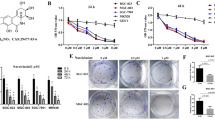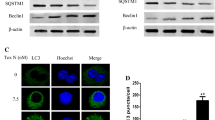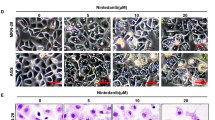Abstract
Purpose
To investigate the occurrence of apoptosis and autophagy on human gastric cancer cells after treatment by Tanshinone I, as well as the relationship between them.
Methods
BGC823 and SGC7901 cells were treated with Tanshinone I; the cell proliferation was measured using CCK-8 and clone formation assay; and the expression of apoptosis- and autophagy-associated proteins was detected by Western blot. Autophagic vacuoles in cells were observed with LC3 dyeing using confocal fluorescent microscopy, and apoptotic cells were detected via flow cytometry. Bcl-2 was overexpressed in gastric cells treated with Tanshinone I or not, and autophagy relative protein was investigated; the interaction between Beclin-1 and Bcl-2 was detected by immunoprecipitation. Cell apoptosis was detected when autophagy was inhibited by ATG7-siRNA. Tumor growth was assessed by subcutaneous inoculation of cells into BALB/c nude mice.
Results
Tanshinone I inhibited the proliferation of BGC823 and SGC7901 cells, and induced cell apoptosis by inhibiting anti-apoptosis protein Bcl-2. Tanshinone I also increased the conversion of LC3I to LC3II and triggered autophagosome formation, without changing the expression of Beclin-1. However, the Beclin-1 VPS34 complexes were increased after Tanshinone I treatment via inhibiting Bcl-2 expression. Moreover, disturbing autophagy by knockdown of ATG7 expression contributed to Tanshinone I-induced apoptosis. In vivo assay showed that combination with autophagy inhibitor chloroquine in nude mice bearing BGC823 xenograft significantly augmented the antitumor effect of Tanshinone I.
Conclusions
Tanshinone I induced apoptosis and pro-survival autophagy via inhibiting Bcl-2 expression on gastric cancer, and the combination of chloroquine and Tanshinone I could inhibit tumor growth more efficiently than monotherapy, which might be considered as an effective strategy for the treatment for gastric cancer.






Similar content being viewed by others
References
Ferlay J, Soerjomataram I, Dikshit R, Eser S, Mathers C, Rebelo M, Parkin DM, Forman D, Bray F (2015) Cancer incidence and mortality worldwide: sources, methods and major patterns in GLOBOCAN 2012. Int J Cancer 136(5):E359–E386. doi:10.1002/ijc.29210
Fish JM, Welchons DR, Kim YS, Lee SH, Ho WK, Antzelevitch C (2006) Dimethyl lithospermate B, an extract of Danshen, suppresses arrhythmogenesis associated with the Brugada syndrome. Circulation 113(11):1393–1400. doi:10.1161/CIRCULATIONAHA.105.601690
Chang PN, Mao JC, Huang SH, Ning L, Wang ZJ, On T, Duan W, Zhu YZ (2006) Analysis of cardioprotective effects using purified Salvia miltiorrhiza extract on isolated rat hearts. J Pharmacol Sci 101(3):245–249
Zhou L, Zuo Z, Chow MS (2005) Danshen: an overview of its chemistry, pharmacology, pharmacokinetics, and clinical use. J Clin Pharmacol 45(12):1345–1359. doi:10.1177/0091270005282630
Chiu SC, Huang SY, Chang SF, Chen SP, Chen CC, Lin TH, Liu HH, Tsai TH, Lee SS, Pang CY, Hsieh TF (2014) Potential therapeutic roles of tanshinone IIA in human bladder cancer cells. Int J Mol Sci 15(9):15622–15637. doi:10.3390/ijms150915622
Hu T, Wang L, Zhang L, Lu L, Shen J, Chan RL, Li M, Wu WK, To KK, Cho CH (2015) Sensitivity of apoptosis-resistant colon cancer cells to tanshinones is mediated by autophagic cell death and p53-independent cytotoxicity. Phytomedicine 22(5):536–544. doi:10.1016/j.phymed.2015.03.010
Hou J, He J, Jin X, Hu T, Zhang Y (2013) Study on optimisation of extraction process of tanshinone IIA and its mechanism of induction of gastric cancer SGC7901 cell apoptosis. Afr J Tradit Complement Altern Med 10(6):456–458
Lin JY, Ke YM, Lai JS, Ho TF (2015) Tanshinone IIA enhances the effects of TRAIL by downregulating survivin in human ovarian carcinoma cells. Phytomedicine 22(10):929–938. doi:10.1016/j.phymed.2015.06.012
Gao H, Sun W, Zhao W, Hao W, Leung CH, Lu J, Chen X (2015) Total Tanshinones-induced apoptosis and autophagy via reactive oxygen species in lung cancer 95D cells. Am J Chin Med 43(6):1265–1279. doi:10.1142/S0192415X1550072X
Xu M, Cao FL, Li NY, Liu YQ, Li YP, Lv CL (2013) Tanshinone IIA reverses the malignant phenotype of SGC7901 gastric cancer cells. Asian Pac J Cancer Prev APJCP 14(1):173–177
Tseng PY, Lu WC, Hsieh MJ, Chien SY, Chen MK (2014) Tanshinone IIA induces apoptosis in human oral cancer KB cells through a mitochondria-dependent pathway. BioMed Res Int 2014:540516. doi:10.1155/2014/540516
Kim MK, Park GH, Eo HJ, Song HM, Lee JW, Kwon MJ, Koo JS, Jeong JB (2015) Tanshinone I induces cyclin D1 proteasomal degradation in an ERK1/2 dependent way in human colorectal cancer cells. Fitoterapia 101:162–168. doi:10.1016/j.fitote.2015.01.010
Su CC, Chen GW, Lin JG (2008) Growth inhibition and apoptosis induction by tanshinone I in human colon cancer Colo 205 cells. Int J Mol Med 22(5):613–618
Degenhardt K, Mathew R, Beaudoin B, Bray K, Anderson D, Chen G, Mukherjee C, Shi Y, Gelinas C, Fan Y, Nelson DA, Jin S, White E (2006) Autophagy promotes tumor cell survival and restricts necrosis, inflammation, and tumorigenesis. Cancer Cell 10(1):51–64. doi:10.1016/j.ccr.2006.06.001
Opipari AW Jr, Tan L, Boitano AE, Sorenson DR, Aurora A, Liu JR (2004) Resveratrol-induced autophagocytosis in ovarian cancer cells. Cancer Res 64(2):696–703
Ellington AA, Berhow MA, Singletary KW (2006) Inhibition of Akt signaling and enhanced ERK1/2 activity are involved in induction of macroautophagy by triterpenoid B-group soyasaponins in colon cancer cells. Carcinogenesis 27(2):298–306. doi:10.1093/carcin/bgi214
Hoyer-Hansen M, Bastholm L, Mathiasen IS, Elling F, Jaattela M (2005) Vitamin D analog EB1089 triggers dramatic lysosomal changes and Beclin 1-mediated autophagic cell death. Cell Death Differ 12(10):1297–1309. doi:10.1038/sj.cdd.4401651
Lu Z, Luo RZ, Lu Y, Zhang X, Yu Q, Khare S, Kondo S, Kondo Y, Yu Y, Mills GB, Liao WS, Bast RC Jr (2008) The tumor suppressor gene ARHI regulates autophagy and tumor dormancy in human ovarian cancer cells. J Clin Investig 118(12):3917–3929. doi:10.1172/JCI35512
Lum JJ, Bauer DE, Kong M, Harris MH, Li C, Lindsten T, Thompson CB (2005) Growth factor regulation of autophagy and cell survival in the absence of apoptosis. Cell 120(2):237–248. doi:10.1016/j.cell.2004.11.046
Tanida I, Ueno T, Kominami E (2008) LC3 and autophagy. Methods Mol Biol 445:77–88. doi:10.1007/978-1-59745-157-4_4
Pattingre S, Tassa A, Qu X, Garuti R, Liang XH, Mizushima N, Packer M, Schneider MD, Levine B (2005) Bcl-2 antiapoptotic proteins inhibit Beclin 1-dependent autophagy. Cell 122(6):927–939. doi:10.1016/j.cell.2005.07.002
Funderburk SF, Wang QJ, Yue Z (2010) The Beclin 1-VPS34 complex—at the crossroads of autophagy and beyond. Trends Cell Biol 20(6):355–362. doi:10.1016/j.tcb.2010.03.002
Cunningham D, Chua YJ (2007) East meets west in the treatment of gastric cancer. New Engl J Med 357(18):1863–1865. doi:10.1056/NEJMe078182
Levine B, Sinha S, Kroemer G (2008) Bcl-2 family members: dual regulators of apoptosis and autophagy. Autophagy 4(5):600–606
Amaravadi RK, Thompson CB (2007) The roles of therapy-induced autophagy and necrosis in cancer treatment. Clin Cancer Res 13(24):7271–7279. doi:10.1158/1078-0432.CCR-07-1595
Bursch W, Ellinger A, Kienzl H, Torok L, Pandey S, Sikorska M, Walker R, Hermann RS (1996) Active cell death induced by the anti-estrogens tamoxifen and ICI 164 384 in human mammary carcinoma cells (MCF-7) in culture: the role of autophagy. Carcinogenesis 17(8):1595–1607
Scarlatti F, Bauvy C, Ventruti A, Sala G, Cluzeaud F, Vandewalle A, Ghidoni R, Codogno P (2004) Ceramide-mediated macroautophagy involves inhibition of protein kinase B and up-regulation of beclin 1. J Biol Chem 279(18):18384–18391. doi:10.1074/jbc.M313561200
Daido S, Yamamoto A, Fujiwara K, Sawaya R, Kondo S, Kondo Y (2005) Inhibition of the DNA-dependent protein kinase catalytic subunit radiosensitizes malignant glioma cells by inducing autophagy. Cancer Res 65(10):4368–4375. doi:10.1158/0008-5472.CAN-04-4202
Seglen PO, Gordon PB (1982) 3-Methyladenine: specific inhibitor of autophagic/lysosomal protein degradation in isolated rat hepatocytes. Proc Natl Acad Sci USA 79(6):1889–1892
Acknowledgments
This work was supported by Shanghai Natural Science Foundation of China (13ZR1434300). The funders had no role in study design, data collection and analysis, decision to publish, or preparation of the manuscript.
Author information
Authors and Affiliations
Corresponding authors
Ethics declarations
Competing interests
The authors have declared that no competing interests exist.
Rights and permissions
About this article
Cite this article
Jing, X., Xu, Y., Cheng, W. et al. Tanshinone I induces apoptosis and pro-survival autophagy in gastric cancers. Cancer Chemother Pharmacol 77, 1171–1181 (2016). https://doi.org/10.1007/s00280-016-3034-6
Received:
Accepted:
Published:
Issue Date:
DOI: https://doi.org/10.1007/s00280-016-3034-6




